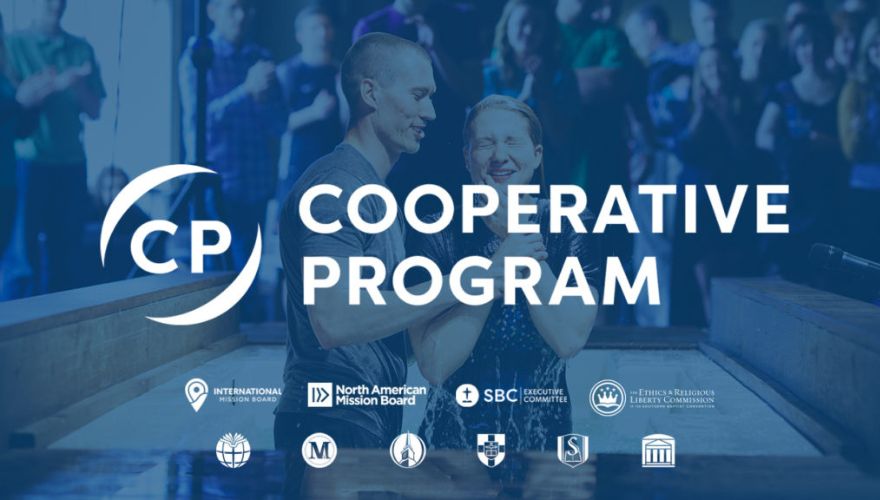
In an age of shifting alliances, denominational decline and theological fragmentation, it’s fair to ask whether long-standing structures still deserve our support.
For many Southern Baptists, one of the clearest examples of such a structure is the Cooperative Program — the unified giving plan that has funded our shared mission, theological education and ministry efforts for nearly a century.
This “one sacred effort” has launched Southern Baptists to the forefront of missional engagement and evangelistic influence for decades.
However, its relevance and effectiveness are often called into question by its own benefactors.
Recently, in conversing with a staff member from another church within our convention, the discussion naturally turned to the Southern Baptist Convention. He inquired about the pressing issues confronting Southern Baptists today.
In response, I sought to offer a balanced perspective — expressing encouragement regarding points of direction of our convention while also speaking candidly about the challenges that, at times, appear daunting. In doing so, I emphasized the remarkable value of the Cooperative Program, which embodies the cooperative spirit that has long characterized Southern Baptists.
To my surprise, he interjected, “What’s the big deal with the Cooperative Program? I think we can spend our money more wisely by stewarding it ourselves and investing in the ministries of our choosing.”
The more I converse with pastors, the more this philosophy appears to prevail. While it may not be vocalized, the actions resulting in declining Cooperative Program percentages indicate such to be true.
For me, this is a concern. But if the adages “put your money where your mouth is” and “actions speak louder than words” bear any possible relevance in our discussion, our church’s sacrificial 10% through this giving mechanism speaks loudly — we believe in it, therefore we give through it. I consider it both our duty and joy.
Amid controversies and questions that seek to distract us from our mission, I still believe in the Cooperative Program. Thus, I offer a few reasons in its defense as to why I still believe it to be the best and most effective method for missional giving.
1. Its priority: It keeps the Great Commission front and center
The Cooperative Program isn’t just about money — it’s about mission. From planting churches across North America to supporting missionaries around the globe, the Cooperative Program is our vehicle for cooperating together in obedience to the Great Commission.
Rather than individual churches struggling to fund missionaries or institutions alone, the Cooperative Program allows us to pool resources and sustain long-term, strategic mission work that makes a difference.
Because of the Cooperative Program, Southern Baptists support more than 3,500 missionaries through the International Mission Board (IMB) and more than 6,300 more through the North American Mission Board (NAMB).
Further, it keeps missionaries on the field faithfully laboring for the gospel — not returning home to raise funds in fear of how they may continue to fund the Lord’s work in their ministry context.
We as Southern Baptists adhere to the conviction that one church is incapable of doing this alone. But together, we can, we are and we have — for the last 100 years.
2. Its partnership: It embodies a theology of cooperation
The Cooperative Program is not just a practical tool; it’s a theological statement. It expresses our belief in the priesthood of all believers, the autonomy of the local church and the power of shared mission. It emerges from the long-held belief that we can accomplish more together than we ever could apart.
Despite our differences, the Cooperative Program reminds us that we are part of something bigger than our own congregations — and expanding far beyond our own field.
If an Acts 1:8 vision pertains to us, as it should, then we understand our incumbent responsibility to be bold witnesses for Christ in Jerusalem, Judea, Samaria and the ends of the earth — anywhere, everywhere, all the time. The Cooperative Program accompanies this concept exceptionally well.
3. Its plan: It trains and equips the next generation
Our six Southern Baptist seminaries are among the best evangelical training institutions in the world, and they are heavily funded through the Cooperative Program. For every future pastor, missionary, counselor and church leader receiving sound, affordable theological education, churches faithfully giving through the Cooperative Program are to be thanked.
Because of the Cooperative Program, these seminaries can keep tuition low and access high — preparing men and women for gospel ministry without burdening them with the accrued debt that often accompanies higher education.
The ripple effect of this investment churches are making in the next generation cannot be overstated. Every graduate entering the field brings the Cooperative Program with them into their ministry and should always remain mindful of the investment Southern Baptists have made in them.
As a two-time graduate of a Southern Baptist seminary and a current Ph.D. student, I am ever mindful of the Cooperative Program’s impact on my life and ministry.
4. Its philosophy: It protects and promotes sound doctrine
Historically, one of the reasons the Cooperative Program has been so effective is that it supports institutions that are committed to biblical fidelity and confessional integrity. Institutions like the IMB, NAMB and our seminaries operate under the Baptist Faith and Message 2000, which sets clear theological boundaries for those who receive Cooperative Program funding.
This means Southern Baptists can give confidently, knowing their dollars are not funding theological drift but are advancing gospel-centered, biblically grounded work. Southern Baptists are “people of the Book,” and the inerrancy and infallibility of Scripture are our foundation.
5. Its participation: It enables every church — big or small — to be engaged
One of the beautiful features of the Cooperative Program is that it levels the playing field. A church with 50 members and a church with 5,000 members both play a significant part in the Great Commission work of Southern Baptists.
Every dollar given through the Cooperative Program is a contribution to a global mission strategy, a church-planting movement, a compassion relief effort and a ministry-training enterprise. There is no competition as to who gives more and who makes a greater impact — together we fund difference-making ministries at home and around the world.
Further, the resources offered by state conventions and the national convention are unmatched. From church training, revitalization, tax issues, care for church leaders, evangelism and discipleship assistance, and disaster relief — and other resources innumerable to count — the Cooperative Program yields an excellent return on investment for its contributors.
6. Its purpose: It’s still the best way to fund a denomination-wide mission
In a time where churches and denominational leaders alike raise questions as to whether the Cooperative Program remains the “best” way to fund our work, I remain confident that it is the best and most effective way for churches of any size, any place and any type to give, go and send for His glory and kingdom.
In a world increasingly marked by competition and fragmentation, the Cooperative Program is a rare and precious example of long-term gospel partnership. While designated giving may be growing, it often fragments our focus. The Cooperative Program, by contrast, preserves the unity of our mission, creates stability for our institutions and allows for strategic, long-term planning.
In times of controversy, the temptation is to withdraw. But faithfulness often means staying put, standing firm and stewarding well the resources entrusted to us for the sake of the kingdom. Withdrawing hurts the mission and those faithful missionaries laboring to carry it out.
I still believe in the Cooperative Program because I still believe in the power of cooperation. I still believe in the mission of the Southern Baptist Convention. I still believe in the gospel that calls us not only to go into all the world — but to go together. I still believe we can do far more together than individually. Together, we make a difference in a world that desperately needs a difference made.
The Cooperative Program isn’t just a giving mechanism. It’s a legacy of faithfulness. It’s a testimony of gospel partnership. And I find it to be still worthy of our belief and support. Would to God that all 47,000 of our Southern Baptist churches rediscover the beauty and necessity of the Cooperative Program — and return to a position of sacrificial giving through it.
(EDITOR’S NOTE — Spencer Bell is pastor of Mt. Zion Baptist Church in Hartselle, Ala. This article originally appeared at alsbom.org.)


